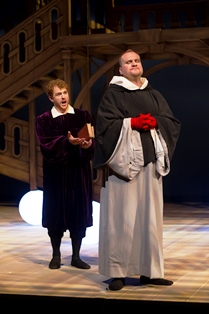
"Galileo Galilei" Ushers in New Era for Cincinnati Opera

The final scene of Cincinnati Opera’s “Galileo Galilei” by Philip Glass, which opened in Corbett Theater at the School for Creative and Performing Arts Thursday evening, said it all.
Centerpiece was a blazing sun, an image suggesting the heliocentric view of the universe -- i.e. that the Earth moves around the Sun and not vice versa -- for which Galileo was condemned by the Roman Catholic Church 400 years ago.
Glass’ 2001 chamber work, a Cincinnati Opera premiere, also marked the company’s debut in its new alternative venue at SCPA. It looks to be a perfect marriage. Intimate Corbett Theater (750 seats) offers comfortable seating and a generous stage area. It will be used in the future for smaller operas as part of Cincinnati Opera’s newly envisioned “opera campus” in Over-the-Rhine. (See http://www.musicincincinnati.com/site/news/Cincinnati_Opera_s_CO2_A_New_Era.html on this site.)
The
production, designed by David Centers and built by Cincinnati Opera, fit the
theater beautifully and drew in the listener from all vantage points. The unitary
set consists of wooden staircases connected by a walkway. Lighted spheres were
flown in and out. Set pieces -- tables, chairs and an incline plane to demonstrate
Galileo’s research into the laws of motion -- were rolled on and off as needed.
A star-lit sky backed many of the scenes. Conductor Kelly Kuo, in his Cincinnati
Opera debut, led skillfully in the pit, with a chamber orchestra comprising 27
members of the Cincinnati Symphony. Balances between stage and pit were excellent and Corbett Theater demonstrated welcoming acoustics.
Ninety-minutes long, "Galileo Galilei" transpires in 10 scenes without intermission. Not
unlike the telescope that Galileo perfected, it looks backward through time,
beginning with the 80-year-old scientist blind (most likely for continuous
observation of the sun) and under house arrest for his scientific teachings. He
reflects on the course of his life: “All those years I looked so hard, as hard as I could, at the lessons of the stars above, missing the lessons below . . . Am I blind for having knelt and lied? Or for not having knelt long enough?"
The
other nine scenes consist of his recantation before the Pope and Cardinals of
the Church, a touching recollection of his beloved daughter Maria Celeste (who predeceased
him at age 33), his trial before the Inquisition, enactment by three fictional
characters of his treatise presenting competing theories of the universe, and
earlier, happier days as he tests his theories of motion using an incline
plane, walks in the garden with his friend, Cardinal Barberini (who became Pope
Urban VIII and oversaw his demise), attends church with Maria Celeste, presents
his telescope to three noble ladies, and finally as a child attending an opera
written by his father Vincenzo Galilei (one of the Florentine Camerata who
created opera). Glass' music is declamatory in style, not unlike opera as it was originally conceived in the late 16th century.
Nine singers undertook the 22 roles. Tenor Richard Troxell was compelling as Old Galileo, frail and halting of step, but with a bright, clear voice that underlined the passion of his beliefs – “And still, I say, it turns (the Earth),” he sings. Soprano Alexandra Schoeny sang Marie Celeste with grace and heft, filling in as Duchess Christina for the presentation of the telescope. Bass Nathan Stark sang three roles with great conviction and credibility, Cardinal Barberini/Pope Urban VIII and Simplicio, the fictional character arguing the geocentric (Earth-centered) view of the universe in the treatise scene. Baritone Andrew Garland as the Younger Galileo projected energy and optimism as the enthusiastic scientist bent on discovery (Garland also covered Salviati, an advocate for intellectual freedom in the treatise scene).
Other roles were sung by countertenor John Holiday (a standout in his Cincinnati Opera debut as Cardinal #1 and Oracle #1 in the final scene), baritone Jonathan Stinson (Cardinal #2, Oracle #2 and a Servant), baritone Jose Rubio (Cardinal #3 and the Priest in the scene in church), mezzo-soprano Audrey Wahstrom (Maria Maddalena and a Scribe) and soprano Meghan Tarkington (Sagredo in the treatise scene, Marie de’Medici and Eos).
The staging by Ted Huffman was superbly handled, with an ease and flow that made for a truly engrossing tale. Helping to unify it was Troxell as Old Galileo looking on as his life replayed itself.
Highlights were many:
- the recantation scene, with Troxell as Old Galileo withering in bright light at the lip of the stage
- the ironic walk in the garden by Galileo and Cardinal Barberini, where Galileo remarks, “I think you might agree, the Bible is a book about how to go to heaven, not how the heavens go,” and is promised support by Barberini, who nevertheless cautions him, “These old theories of Copernicus (heliocentrism), you’d best leave that alone.”
- the scene in a church with a priest chanting the liturgy while Galileo and Maria Celeste ponder the pendulum-like motion of the lamp above their heads
- the scene explicating Galileo’s treatise, “Dialogue Concerning the Two Chief Systems of the World,” with masked characters debating the geocentric and heliocentric views of the universe.
- Vincenzo Galilei’s opera-within-an-opera, a splashy presentation of the Orion myth wherein Orion is blinded by his true love’s jealous father and seeks restoration of his sight from Eos, goddess of the dawn.
A finer ending to the opera could hardly have been imagined than the chorus singing, “Immortal now he lies among the stars,” clearly a reference to Galileo himself.
The opera repeats at 7:30 p.m. Sunday, Wednesday and Friday (July 14, 17 and 19) and 3 p.m. July 21 in Corbett Theater at the School for Creative and Performing Arts. Tickets at (513) 241-2742 or online at www.cincinnatiopera.org